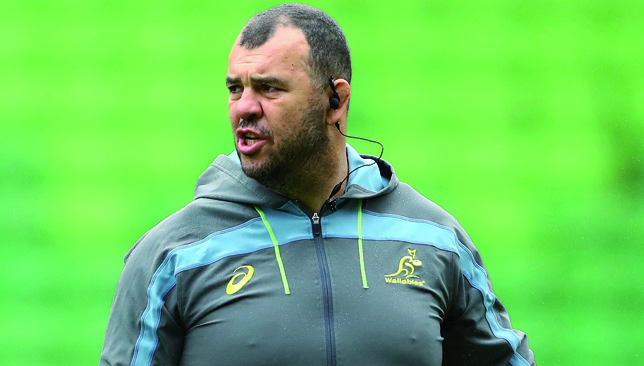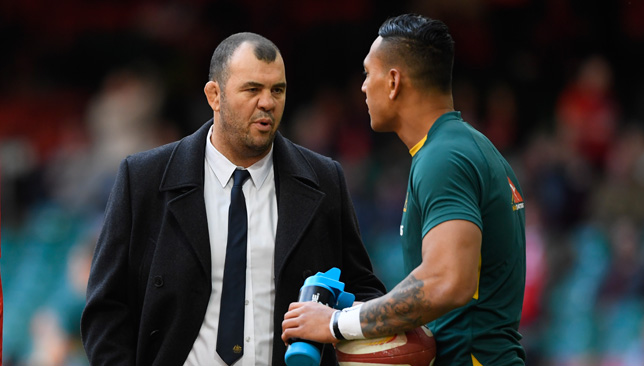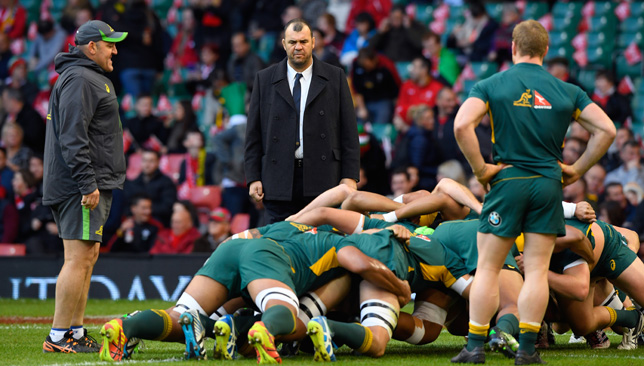
Wallabies coach Michael Cheika talks a good game.
And when he began his reign in October 2014, after the shocking resignation of Ewen McKenzie, the results matched the rhetoric.
From his appointment to the end of the Rugby World Cup in 2015, the Wallabies won 11 out of 16 matches (69%) including defeating the All Blacks for the first time since 2011 and reaching the 2015 RWC Final.
But since then Cheika’s team has struggled. In their past 18 matches they have won just eight (44%), including five losses in a row last year and losing a home Test series against England (0-3) for the first time in history.
For Cheika, this was expected. The former Leinster, Stade Francais and NSW title-winning coach is determined to transform the way the Wallabies play the game and in the interim it’s inevitable that results will suffer.
“Sometimes you think you have got to go that way (be defensive),” says Cheika, “that those (attacking) things that work at a level down are not going to work at Test level.
Traditionally people would say ‘no, they won’t’ but I’ve never been a traditionalist.”
The 50-year-old is even more focused this year and regrets backing away from his transformation plan last season.
“I actually think last year we got talked around a little bit, into ‘You’ve got to play Test football doing one, two and three. That’s the way it’s always been played’,” he admits.
“I didn’t push as hard myself to say, ‘no, this is how we want to play, this is how the supporters want us to play. We are going to play like that, let the cards fall where they do’.
“Maybe we were thinking too much about the outcomes than how and just readjusting that balance a little bit.”

Michael Cheika chats with Wallabies full-back Israel Folau.
Cheika won the Super Rugby crown in 2014 with the Waratahs, the first time in 19 attempts that the under-performing NSW team managed that feat, and he did so playing a high-octane, highly entertaining style of rugby that had the city buzzing and the stands full.
This is the style that Cheika wants the NSW-laden Wallabies to emulate but it has been a painful transition. The coach however can not take all the blame with Australian rugby currently experiencing a talent drain.
Their five Super Rugby teams’ performances have been abysmal, winning just 20 of their 56 matches played in the tournament this year. The results are so bad that one team is due to be culled next season.
But Cheika is undeterred, even after the Wallabies slumped to a surprise 24-19 loss to an under-strength Scotland in the June series. They even required two late tries to overcome an Italy side who lost to Fiji the previous week.
Wallaby fans are unsurprisingly worried.
When Jack Quigley, a rugby coach and fan, posted a drunken rant on Facebook and the post received over 53,000 likes, Cheika gave him a call to discuss it.
“I think that’s important that you talk to the fans,” explained Cheika.
“I just spoke to him about some of the things that we’re feeling and what we want to do and what’s going on in the background because we’re feeling the same thing as the fans, too.”

The Wallabies continue to go through a transitional period under Cheika.
But clearly Australian rugby is not at the level it should be. How do you fix that?
“Well you identify exactly what the reason is from our understanding and the analysis we’ve done and we look to address it. Simple.
“There’s been a lot of conversation around talent, and our results are not because of our talent situation – I’m telling you now.
“We’ve got to identify what it is – we’ve got a lot of good players – and we feel we’re down the road on doing that.
“We’re already talking to players about what we think are the key things that they need to be (addressing), the things that are making a (bad) habit for themselves. So they can understand that now and the predicament they’re in.
“Things can change at that point very quickly. Once you know what the issue is stopping you from playing your best footy and also having a plan on how to address it.”
He is adamant that the problem is not from a lack of skills compared to the other heavyweights of the global game.
“Last year we struggled a bit, this year we’ve struggled much more – but I don’t think all of a sudden we’ve forgotten how to do things,” he insists.
“I know for a fact that players who have been making skill errors, those same players I’ve seen do those skills under immense pressure. So they forget how to do it?”